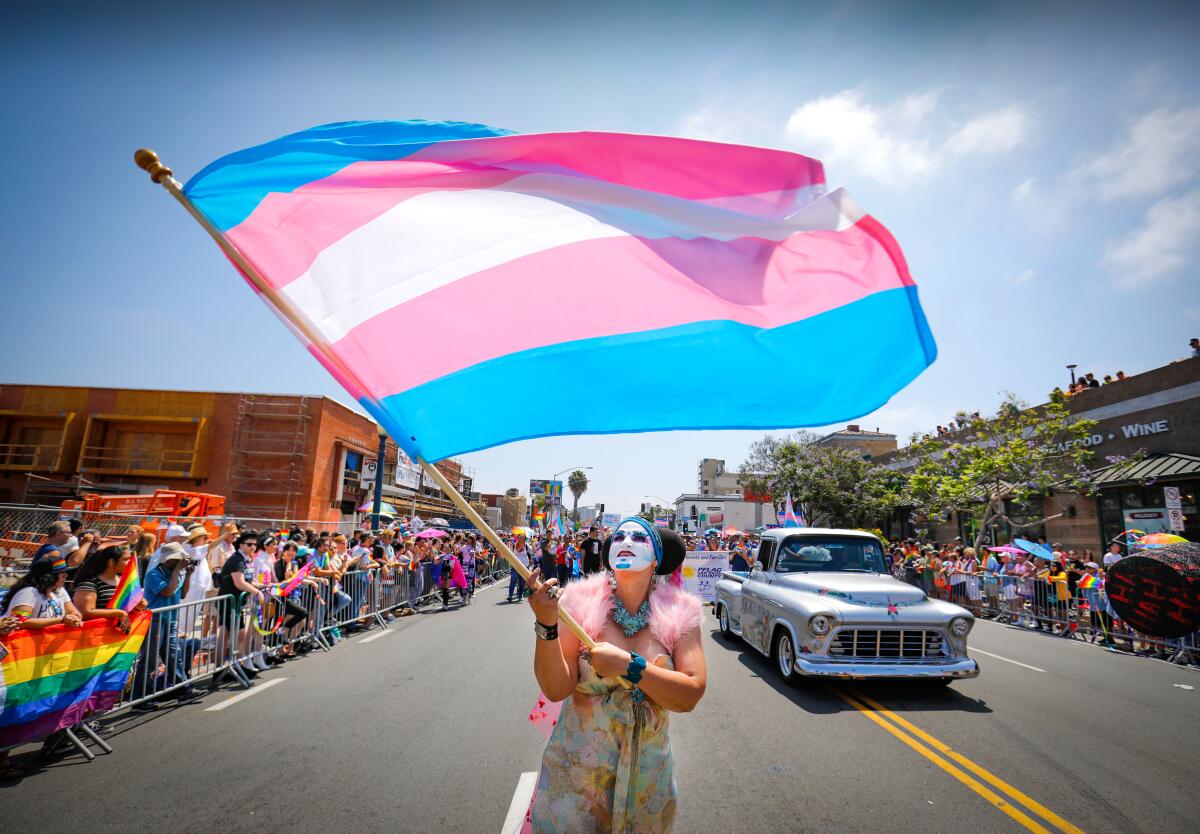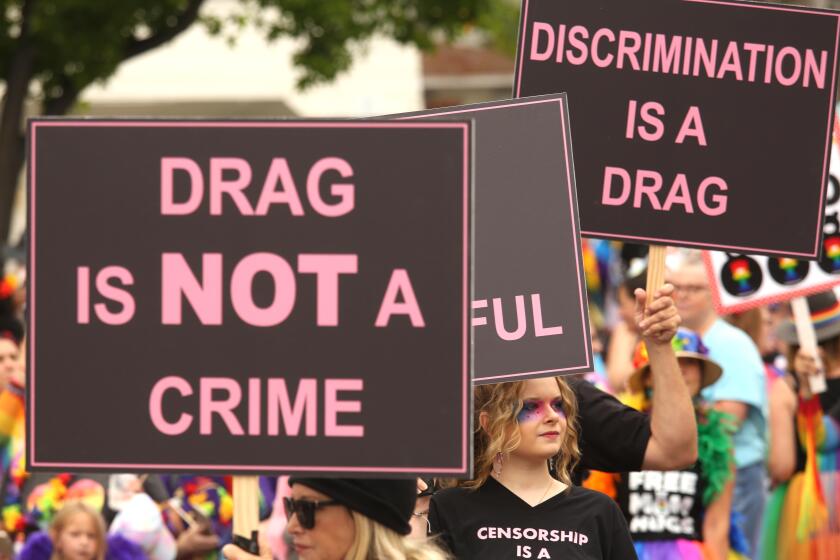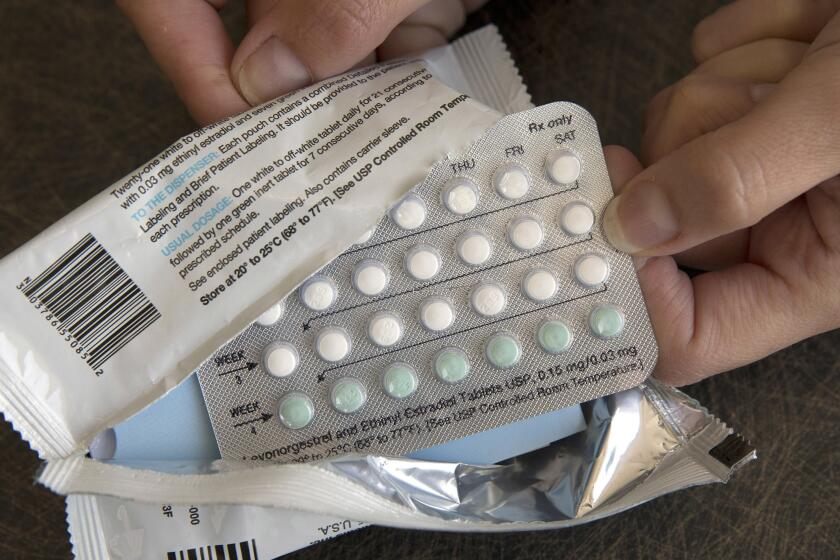I’m 17, trans and loving life. Joy should be the norm for trans people

- Share via
Recent headlines about transness paint a bleak picture: In Ohio, lawmakers just approved a bill to outlaw gender-affirming care and bar trans women from competing in women’s sports.
Brands such as Nike, Pantene and Bud Light face backlash for using trans people in their ads. And a study shows an alarming level of bullying of trans kids at school.
Here’s a handy rule of thumb for sports journalists: Let people describe themselves.
But that’s only half the story. When transgender people have access to gender-affirming resources and a supportive community, being trans is actually a joyful thing. In the words of Dr. Johanna Olson-Kennedy, medical director of Children’s Hospital Los Angeles’ Center for Transyouth Health and Development, “We spend so much time on dysphoria and none on euphoria.” That doesn’t have to be the case.
I recall the joy I felt as a little kid expressing my femininity. I routinely played dress-up, took on the role of a girl in make-believe games with friends and shamelessly declared: “I want to be a girl.” I even went through a phase of dressing up as Amy Winehouse (yes, beehive, eyeliner and all), and performing as her for my family. She remains my favorite musician to this day.
Q. is remarkably tuned in to the national conversation and laws that put queer people in danger. She knows it’s not safe for her to truly emerge.
As I got older, I became conscious of the fact that my personality, who I was, wasn’t considered normal. None of the other boys in my class, at least that I knew of, were going home, putting on a wig and singing “Tears Dry on Their Own” into the camera on their mom’s computer.
Quickly, this awareness of my difference turned to shame, and the feelings in which I had once found joy expressing, the person I once was proud to be, seemed out of reach.
Confusion led me to invalidate myself, to bottle up my feelings, until I couldn’t stand it any longer.
Proposals to restrict transgender healthcare are ignoring a history of safe and effective treatment for both transgender and cisgender Americans.
It wasn’t until I was 14 that I mustered up the courage to go on puberty blockers and start taking estrogen. It was exciting and validating to look in the mirror each day and see a body in which I gradually felt more comfortable and myself. Not only did the distress begin to lessen, but a new feeling emerged: elation with whom I was becoming.
At last, I was reclaiming the trans joy I had abandoned during childhood simply because I didn’t know I had a right to it.
I’m not alone in that experience of joy. When Rook Campbell, a USC professor and competitive athlete, began his transition, a group of guy friends threw him a shaving party. “It was just fun,” he said. “We were just shaving our faces. It was so, I don’t know, silly and unnecessary, but very sweet.”
It’s wholesome moments of love and acceptance such as these that highlight an important truth: Trans people’s happiness is largely a product of how we are treated by the people around us. In the first months of my transition, as I opened up to friends and family, I was met with unconditional support. As a result, I felt comfortable experimenting with my gender expression.
My first day on estrogen, I received a package in the mail full of jewelry and accessories that, in my defense, were very in at the time. So, I put on a (very) full face of makeup, too many necklaces, and posted myself all over Instagram and TikTok. Rather than bullying or trying to change me, my friends left comments calling me beautiful and making me feel proud to be myself. I wouldn’t have become who I am now had I been pressured to change. The love around me let me find myself.
As Campbell says: “Euphoria does not come when someone you’re with is uncomfortable with your gender.”
Because there are increased rates of mental illness among trans people, there’s a common misconception that transness is to blame or that transness is a symptom of an underlying problem. That thinking overlooks the obvious explanation for a correlation: the wide array of social factors that make life as a trans person a struggle. In fact, transitioning can greatly relieve internal pain and incoherence.
Gina Chua, executive editor of the media startup Semafor, relates her transition to the time she went on a nine-day fast: “At the end of it you have your first meal. You can taste everything. It doesn’t matter how bad the meal is. You have all the sensations on your tongue and your mouth and you’re like, wow. I can’t believe food is like this.”
Today, I look in the mirror and am not filled with distress over the body I inhabit. Rather, I feel feminine, beautiful, empowered. In fact, I sometimes find myself unable to avert my eyes. That may sound vain, but never again will I let myself be ashamed for appreciating my trans body and trans mind.
Without the unconditional support of my family and community, and without access to lifesaving gender-affirming care, I wouldn’t have the privilege of self-love and resonance between body and mind. Trans joy should not be a rarity. It should be the norm.
Alessandra Kahn is a high school senior in Los Angeles.
More to Read
A cure for the common opinion
Get thought-provoking perspectives with our weekly newsletter.
You may occasionally receive promotional content from the Los Angeles Times.












